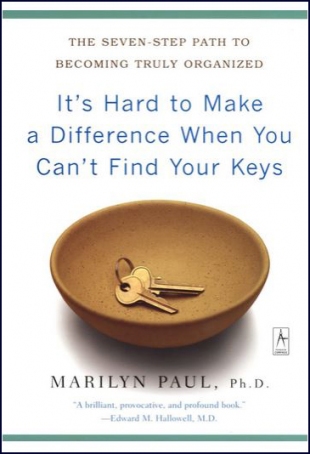Do you constantly have trouble finding things? Are you easily distracted from matters at hand? Do you have a need for constant novelty? Are you the kind of person who never arrives on time for appointments? Do you tend to procrastinate? Are you impulsive? These are symptoms of individuals who regularly experience chronic disorganization.
Marilyn Paul has a Ph. D. in organization and management from Yale University and a M.B.A. from Cornell. Her interest in this subject stems from her own lengthy battle with deeply entrenched habits of disorganization. For a long time, she underplayed the importance of keeping things in order, feeling that such efforts were roadblocks to her creativity and self-expression. Now, she is organized and convinced that being so has great benefits in all departments of life.
Paul presents a seven step program for becoming organized:
1. Establish Your Purpose.
2. Envision What You Want.
3. Take Stock.
4. Choose Support.
5. Identify Strategies for Change.
6. Take Action.
7. Go Deeper to Keep Going.
Disorder can seriously damage self-confidence, relationships, and your reputation. It results from the conscious and unconscious choices we make, and will power alone will not get us out of it. We need to look at the physical, mental, emotional, and spiritual issues related to how we organize our lives. The wisdom of this approach is apparent in the author's contention that disorganization is a great gift because it can set people on a path of deeper self-discovery. As Paul puts it: "Living well is ultimately about loving yourself and others, connecting with what really matters to you, and taking actions based on what you truly care about. Being organized actually can improve your chances of doing so."
Many of the practical steps the author suggests have a spiritual foundation. Getting rid of clutter is part of creating beauty in your environment. Paying attention to what you are doing grows out of meditation and other spiritual disciplines. Arriving on time and keeping a schedule show our respect for others. The discipline of returning things to their place is another act of reverence. It's Hard To Make A Difference When You Can't Find Your Keys is a superb resource packed with sound advice and a holistic sense of organization.
